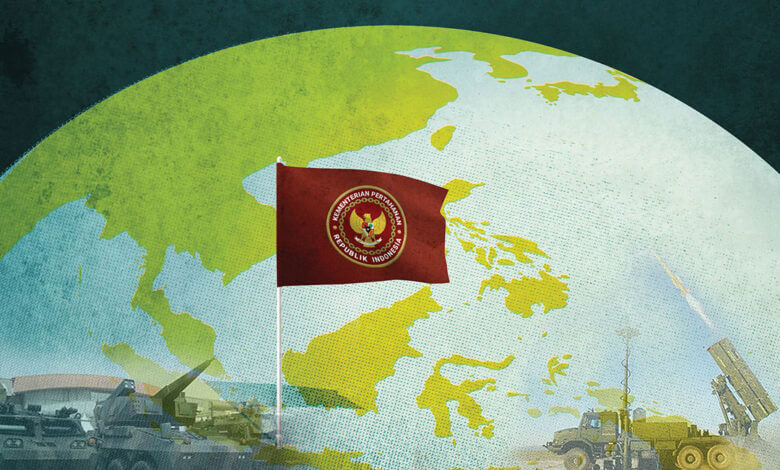Indonesia's Defense System and Geopolitical Challenges in 2024 (Part I)

Indonesia, with its unique characteristics as the world’s largest archipelago, faces complex defense and geopolitical system challenges in 2024. The management of national security and efforts to maintain sovereignty in the midst of global geopolitical dynamics are so complex with its geographical conditions consisting of thousands of islands.
In 2024, crucial factors play an important role in shaping Indonesia’s security landscape. One of the main focuses is maritime resilience, given Indonesia’s geography of thousands of islands. Threats to maritime sovereignty are significant, especially in relation to maritime border disputes with neighboring countries, such as in the context of the North Natuna Sea dispute.
Increased military activity in the region demands special attention. Therefore, the need to strengthen naval power is a must. Investments in maritime military capabilities, including advanced warships and sea defense equipment, will enhance Indonesia’s ability to safeguard its sovereignty in vast and complex seaboard.
Key Challenges in Geopolitical Dynamics
Maritime disputes and sea sovereignty in the North Natuna Sea or South China Sea region have become one of the main challenges in Indonesia’s geopolitical dynamics. As the largest archipelagic country in the world, Indonesia has a great interest in maintaining its sovereignty, especially regarding maritime borders and exclusive economic zones (EEZs).
The dispute involves several countries, including China, Vietnam, the Philippines, Malaysia and Brunei. Overlapping territorial claims, increased military activity and the establishment of military installations on remote islands create significant tensions in the region.
These disputes have great potential to affect regional stability. Impacts include political and military instability with the potential to disrupt international trade routes, including the Strait of Malacca.
Strengthening the strength of the Indonesian Navy is therefore a crucial factor in maintaining maritime security. Investments in warships, defense technology and maritime monitoring are important steps to ensure that Indonesia has adequate capabilities to protect its territorial seaboards, and is ready to respond to any potential threats.
At the same time, diplomacy must be effective in order to be the key to resolving this dispute. Diplomatic efforts through international forums, such as ASEAN, and bilateral dialog with the countries involved, can be a means to achieve a just and sustainable solution.
Actively engaging in regional cooperation, especially through ASEAN, can create a platform for open dialog and multilateral cooperation. ASEAN can serve as an effective mediator to resolve disputes and build trust among its member states.
Also preventive measures encouraging negotiations to reach mutual agreements, such as the Code of Conduct in the North Natuna Sea, can help create a mutually beneficial framework and reduce the risk of conflict.
Indonesia, as a key player in the region, has a great responsibility in maintaining stability and security. Strengthening military power, international support and effective diplomacy are therefore a necessary strategic combination to address maritime disputes and sea sovereignty, with the aim of realizing peace and stability in the South China Sea.
Military Power Becomes a Crucial Element
Strengthening military power is a crucial element in maintaining Indonesia’s sovereignty and national security. Improving military capabilities, including the adoption of the latest military technology and adequate personnel training, is a strategic step to deal with threats that may arise in the future.
Investments in the latest military technologies, such as advanced air defense systems, modern warships and precision weapon systems, can enhance deterrence and military response capabilities. With these technologies, Indonesia can maintain effective responsiveness to threats from various domains, whether at sea, air or land.
The institutionalization of adequate personnel training is also crucial. Well-trained military personnel have a direct impact on operational effectiveness and military readiness. Improving the quality and quantity of personnel, along with continuous training, will enhance the professionalism and readiness of the Indonesian military.
Strengthening military forces must be balanced with good governance and human rights principles. Increased transparency, accountability and public oversight of the defense budget can ensure that investments support national interests and are made efficiently.
With a holistic strengthening of military power, Indonesia can deal with various threats that may arise in the future. With a combination of the latest military technology, well-trained personnel, strong cyber protection and good international cooperation, Indonesia can ensure that national sovereignty and security are maintained amidst global geopolitical and security dynamics.
In addition, international cooperation in the defense sector can also be a means of strengthening military power. Engaging in joint exercises, intelligence sharing, and cooperation in military research and development can enhance interoperability and joint strength in the face of complex security challenges. (To be continued)
(Prof. DR. Drs. Ermaya Suradinata, SH, MH, MSI, is the former Director General of Sospol of the Ministry of Home Affairs RI, Rector of IPDN, Governor of Lemhannas RI, and currently the Board of Experts for Geopolitics and Geostrategy of BPIP RI.)
